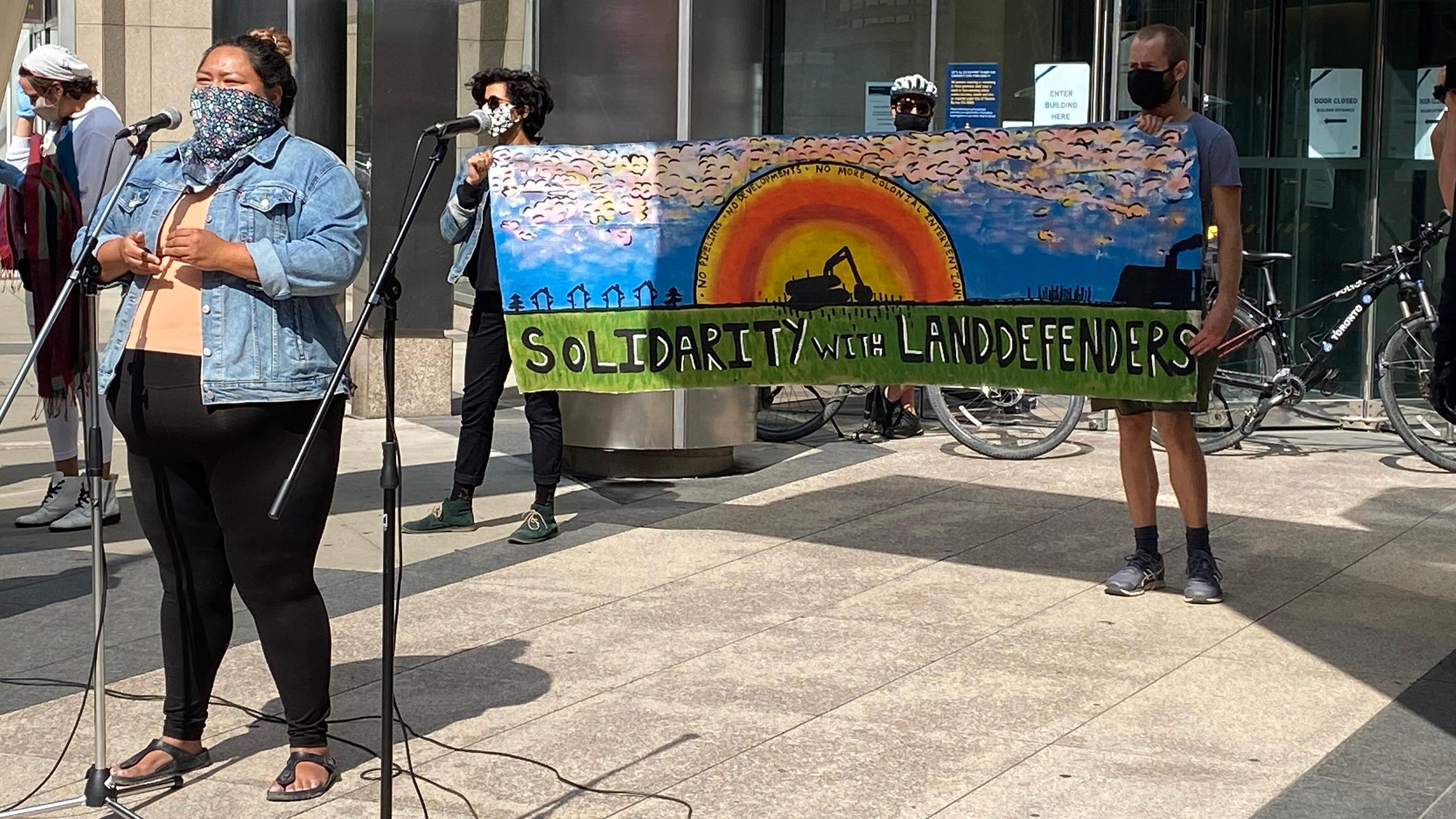By Samreen Maqsood
Courtney Skye, a member of the Mohawk First Nation and researcher on Indigenous policy at Ryerson-based research centre Yellowhead Institute, was arrested while defending Indigenous land in Caledonia, Ont. on Sept. 3.
The use of court injunctions to arrest protestors like Courtney Skye represents a major issue for Indigenous sovereignty of treaty land, according to a statement released on behalf of Haudenosaunee women by the Yellowhead Institute at Ryerson.
Protesters have occupied so-called Mackenzie Meadows, bordering the town of Caledonia and the Six Nations reserve, since July in opposition to the housing development of the neighbourhood by Foxgate Developments Inc. The site is under the sovereignty of the Haudenosaunee First Nation as one of their last unceded territories under the 200-year-old Haldimand Proclamation. Today, it has become an encampment for protestors, featuring art such as a shipping container spray painted with the site’s unofficial title: 1492 Land Back Lane.
In 2013, there were a series of community meetings where 66 out 78 participants voted against the development, according to Skye’s panel during Ryerson faculty’s scholar strike against anti-Indigenous and anti-Black racism. Nevertheless, band council signed the agreement in 2016.
The land defenders at Land Back Lane “are facing [prosecution] to make sure that they’re able to stay there safely,” said Skye. “This is an unacceptable approach to addressing Indigenous rights.”
Along with Skye, 15 others were arrested by the Ontario Provincial Police (OPP) between Aug. 5 and Sept. 4, with some being taken from their homes and workplaces near 1492 Land Back Lane. They included those providing food and supplies and independent journalists.
“They were arrested in very traumatic ways. People who showed up to the site only once or twice to drop off supplies were pulled over on the highway by six police cars,” said Skye.
Skye has since been released from police custody but was charged with disobeying a court order and mischief in relation to 1492 Land Back Lane.
Yellowhead Institute shows support for Skye
In response to the arrest of Skye and other land defenders, the Yellowhead Institute published three demands with the support of Indigenous faculty at Ryerson.
The three demands are for the attorney general of Ontario to drop all charges against Courtney Skye and other land defenders relating to 1492 Land Back Lane, for the federal government to “engage with the volumes of evidence on criminal justice reform and Land Back” and for the province of Ontario to prohibit the use of injunctions on Indigenous people.
Injunctions are orders issued at the judicial discretion of a court and have been used to supersede historic treaties such as the Haldimand Proclamation and criminalize those who would defend it. According to research from the Yellowhead Institute, nearly 81 per cent of injunctions filed by corporations against First Nations were granted by federal courts. Conversely, about 80 per cent of injunctions filed by First Nations against corporations or the government were denied.
“Injunctions are a blunt weapon used to deny Indigenous jurisdiction,” the statement reads. “What follows is the militarization of Indigenous lands and the criminalization of land defenders.”
Injunctions also legitimized the violent arrests of protestors showing solidarity with the Wet’suwet’en First Nation in January 2020.
Shiri Pasternak, research director at the Yellowhead Institute, said each of their demands are grounded in the Yellowhead Institute’s body of research, including a series of policy briefs by Black and Indigenous authors that examine the crisis of policing.
“Injunctions are a blunt weapon used to deny Indigenous jurisdiction”
“They advocate for a wide range of changes, including police and prison abolition and found how systemic structural racism, colonial violence and white supremacy are [intrinsic] to the criminal justice system,” she said.
Lana Brite and other members of Rising Tide Toronto, a collective of grassroots organizations, held a rally in front of the Ministry of Indigenous Affairs on Sept. 12 for the 26 people arrested at 1492 Land Back Lane. “For the Land Back defenders, there is no break. They’ve been out for 54 to 55 days in Land Back Lane to protect their unceded land,” said Brite.
Russ Diabo, a First Nations policy analyst and a member of the Mohawk First Nation, spoke at the rally about Justin Trudeau’s campaign promises for reconciliation made in 2015. “Right away, he has wanted to talk about reconciliation, but ignored the truth about the outstanding issues that still have to be resolved about the land theft in Canada. Ontario is one of the biggest perpetrators of this,” he said.
Canada’s current land claim policies were introduced in 1973 in an attempt to compensate for historical violations of Indigenous treaties. “[They’re] not about land back. They are about money,” said Diabo.
Under Canada’s Indian Act, the Haudenosaunee First Nation would first have to purchase Land Back Lane from the government before applying for reserve status. “Does that sound like reconciliation?” asked Diabo.
“I hope these events and rallies connect city-based non-Indigenous peoples to the land struggles unfolding all around us, at all times, and help to build stronger relationships of solidarity and support,” said Pasternak.










Leave a Reply